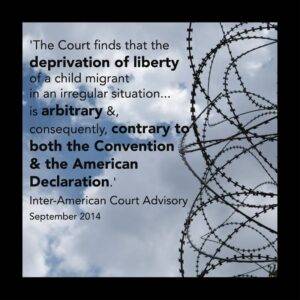IPPDH del MERCOSUR emite nueva guía de la Opinión Consultiva OC-21
SAN JOSÉ (6 de diciembre de 2014) – El 19 de agosto de 2014, la Corte Interamericana de Derechos Humanos(CIDH) publicó su más reciente Opinión Consultiva 21 (OC-21) sobre los Derechos y Garantías de Niñas y Niños en el Contexto de la Migración y/o en Necesidad de Protección Internacional, solicitada en 2011 por los cuatro Estados del MERCOSUR: Argentina, Brasil, Paraguay y Uruguay.
Ahora, el Instituto de Políticas Públicas en Derechos Humanos del MERCOSUR (IPPH) ha publicado una guía para la Opinión Consultiva OC-21. Este documento proporciona detalles sobre el contexto histórico en el que se emite la OC-21, al tiempo en que ayuda a explicar su importancia en el marco de derechos de la niñez y y provee de una visión general sobre los estándares y principios a observarse por parte de los Estados en materia de niñez y adolescencia migrante y solicitante de asilo.
Entre los diez puntos que se destacan en esta nueva guía de la Opinión Consultiva OC-21 son:
- Los derechos del niño “debe prevalecer sobre cualquier consideración relativa a su nacionalidad o estatus migratorio”;
- “Los Estados no pueden recurrir a la privación de libertad de los niños que están con sus padres, separados o no acompañados”;
- Los Estados deben diseñar e incorporar “medidas no privativas de libertad. . . que dan prioridad a la protección integral de los derechos de los niños “;
- Los Lugares de acogida de los niños deben “garantizar la protección integral de los derechos en un entorno no privativo de su libertad”;
- “Los Estados no pueden expulsar a uno o ambos padres por infracciones migratorias de carácter administrativo'” cuando “el derecho del niño a la vida familiar se sacrifica de manera irrazonable o excesiva”;
- Los Estados tienen el deber de tomar en cuenta la Opinion Consultiva “al diseñar, adoptar, ejecutar y aplicar sus políticas de inmigración.”
Como ya ha sido señalado anteriormente por la IDC, la opinión consultiva es una declaración clave que establece obligaciones mínimas de los Estados para garantizar la protección de los derechos de los niños migrantes. Es importante destacar que la opinión consultiva reafirmó y amplió la también importante Recomendación 2012 del Comité de las Naciones Unidas sobre los Derechos del Niño (párrafo 78.) que:
Los niños no deben ser criminalizados o sujetos a medidas punitivas a causa de su situación migratoria o la de sus padres. La detención de un niño debido a su situación migratoria o la de sus padres constituye una violación de los derechos del niño y siempre contraviene el principio del interés superior del niño. En este sentido, los Estados deben erradicar de manera expedita y completa la detención de niños por motivo de su situación migratoria.
La Opinión Consultiva y esta nueva guía publicada por la IPPDH son herramientas clave para los responsables políticos, las Naciones Unidas y los organismos intergubernamentales y las organizaciones de la sociedad civil que defienden y trabajan a favor de los niños migrantes en el contexto de la migración.
Recursos:
Corte Interamericana: Opinión Consultiva OC-21
MERCOSUR IPPDH, Nota de Difusión: Corte Interamericana fija el umbral de protección de la niñez migrante
International Detention Coalition: Corte Interamericana pronuncia que la detención de niños, niñas y adolescentes por motivos migratorios siempre es arbitraria
Global Campaign to End Child Immigration Detention: Inter-American Court of Human Rights strongly against child detention
UN expert to Italy – “A humanitarian crisis must have a global humanitarian response”
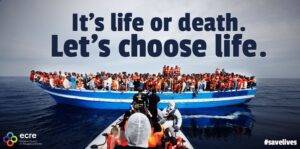 ROME (5 December 2014) – Following his recent visit to Italy, the United Nations Special Rapporteur on the human rights of migrants, Mr. François Crépeau, has called for a “global humanitarian response” to the increasing number of migrants and asylum seekers crossing the Mediterranean Sea.
ROME (5 December 2014) – Following his recent visit to Italy, the United Nations Special Rapporteur on the human rights of migrants, Mr. François Crépeau, has called for a “global humanitarian response” to the increasing number of migrants and asylum seekers crossing the Mediterranean Sea.
“More people are arriving at Europe’s borders because they rather risk their own death at sea or that of their children than to stay in their own country or in countries of transit. This gives an idea of the level of desperation. . . . This requires a new and concerted strategic approach by European States and international community.”
In 2012, the Special Rapporteur undertook a one-year comprehensive study to examine the rights of migrants in the Euro-Mediterranean region, focusing in particular on the management of the external borders of the European Union. Starting with a visit to the EU authorities in Brussels, Mr. Crépeau also visited Turkey, Tunisia, Greece and Italy. His country reports can be found online.
In this follow-up visit, Mr. Crépeau, who praised Italy’s “extraordinary efforts” through its Mare Nostrum operation, which in 2014 saved the lives of over 150,000 people who attempted to cross the Mediterranean Sea.
The Special Rapporteur noted that migrants and asylum seekers are fleeing conflict, violence and poor governance in search of a better life for themselves and their families.
“No matter which way we look at it, the situation comes down to one thing: migrants are human beings and, just like the rest of us, they too have rights. They too have the right to live and thrive.”
The Mare Nostrum operation is coming to an end because of lack of funds and support from other countries in Europe. It will be replaced by EU Frontex operation Triton, which will be limited to defending Italy’s maritime border. As a result, rights groups are concerned that there will be more unnecessary deaths at sea, and that states will continue to criminalize irregular entry and resort to the detention of irregular migrants and asylum seekers.
Mr. Crépeau noted that Italy’s policy and programme response to migration continues to have human rights protection gaps. Italy must still make progress in a number of areas: refrain from pushbacks; ensure that adequate individual assessments are carried out upon arrival at the Italian reception centres, in order to identify particular vulnerabilities and support needs; as well as continue to reduce unnecessary detention, in particular through the adoption of alternatives to detention.
Mr. Crépeau also urged Italy to provide increased protection to vulnerable groups, such as unaccompanied minors through improved best interest of the child determination procedures, and facilitate access to justice, by simplifying judicial procedures and providing low-cost quality legal representation to migrants for all the procedures they need to go through.
“One thing we have learnt since the tragedy of Lampedusa a year ago, is that repressive policies fail to deter irregular migration because hope is always stronger,” he noted. “Sealing international borders is impossible, and migrants will continue arriving despite all efforts to stop them, at a terrible cost in lives and suffering.”
A follow-up country mission report and a thematic report on EU border management will be presented to the UN Human Rights Council by the Special Rapporteur in June 2015.
Resources:
Press Release: Italy / Migrants: “A humanitarian crisis must have a global humanitarian response” – UN rights expert
Country Reports: All country reports of the UN Special Rapporteur on the human rights of migrants
Thematic Report: Detention of migrants in an irregular situation
Thematic Report: Management of the external borders of the European Union and its impact on the human rights of migrants
Closed borders, dangerous journeys, trafficking & detention: little opportunity for safety in MENA
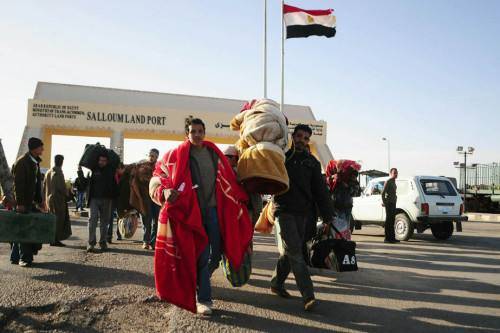 Within MENA and on the border with Europe, we are seeing widespread reports of tightening and even closing of borders making movement of people, including refugees fleeing Syria, increasingly difficult (Syria/Jordan, Morocco/Spain, MENA/EU, Egypt/Libya). Recently IOM reported that the Mediterranean Sea is the world's most dangerous border between countries not at war with each other.
Within MENA and on the border with Europe, we are seeing widespread reports of tightening and even closing of borders making movement of people, including refugees fleeing Syria, increasingly difficult (Syria/Jordan, Morocco/Spain, MENA/EU, Egypt/Libya). Recently IOM reported that the Mediterranean Sea is the world's most dangerous border between countries not at war with each other.
With little opportunity for regular movement, those seeking to move, often seeking protection, may take dangerous journeys at the hands of smugglers, with many lives lost along the way, and/or may become victim to human traffickers. Children face particular risks: in Africa and the Middle East, two thirds of trafficked persons are children. There are reports that smugglers are increasingly using children to sail boats from Libya and Egypt across the Mediterranean, leaving those children at risk of criminal charges & jail in Italy. In Egypt, there are Syrian & Palestinian children amongst a group of refugees detained, now at risk of imminent deportation from Egypt, with fears of refoulment.
In Tel Aviv, where asylum seekers who have survived the incredibly dangerous journey across the Sinai, the Israeli government is yet again looking to push through the much contested Anti-infiltration bill, young asylum seekers detained in Holot ‘rap of broken promises'.
UN Special Rapporteur on the Right to Health - Visit to Malaysia
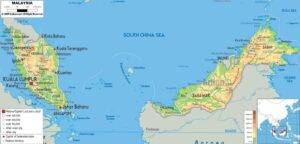 KUALA LUMPUR (2 December 2014) - The UN Special Rapporteur on the right of everyone to the enjoyment of the highest attainable standard of physical and mental health, Mr. Dainius Pūras, has issued his preliminary observations and recommendations following his country visit to Malaysia from 19 November to 2 December 2014.
KUALA LUMPUR (2 December 2014) - The UN Special Rapporteur on the right of everyone to the enjoyment of the highest attainable standard of physical and mental health, Mr. Dainius Pūras, has issued his preliminary observations and recommendations following his country visit to Malaysia from 19 November to 2 December 2014.
The Special Rapportuer noted that undocumented migrants and asylum seekers face significant barriers in accessing health care in Malaysia. He also raised concerns over the establishment of immigration counters inside Malaysian public hospitals, through which undocumented migrants and asylum seekers are reported to immigration authorities when they seek medical attention.
He also noted with alarm the recent practice of arresting and detaining undocumented women migrants and asylum seekers within days of giving birth at public hospitals and urged the Malaysian government to cease this practice.
"I am alarmed at testimonies received about a recent wave of arrests of undocumented women migrants and asylum seekers who, only a few days after giving birth, were taken from hospitals directly to detention centres. In those centres, some of these women and their new-born babies reportedly did not receive the necessary medical attention or the appropriate care from the authorities. I urge the authorities to stop this practice, and to refrain from using the health system for law and order purposes."
During his visit, the Special Rapportuer visited two Malaysian immigration detention centres: Leggeng Detention Centre and the Kuala Lumpur International Airport immigration depot. He noted that conditions in these detention centers fell short of complying with international standards, and food provided was not of sufficient quality or quantity.
The Special Rapporteur's observations and recommendations will be elaborated in further detail in a report to be submitted to the UN Human Rights Council in June 2015.
Australia Blocks Resettlement of Refugees from Indonesia
The Australian government has announced that asylum seekers registered with UNHCR in Indonesia after 1 July 2014 will not be eligible for a place in Australia's humanitarian refugee intake. Moreover, Australia will cut its refugee intake from Indonesia to 450 persons a year.
This announcement has been met with strong criticism from the Indonesian government, who has said that Australia's decision will place an even greater burden on Indonesia.
Indonesian civil society group SUAKA has also issued a strong statement condemning the decision, noting that the policy places refugees in Indonesia in increasingly difficult conditions given the lack of national legal guarantees to protect refugees.
UNHCR's Representative in Indonesia has also spoken out against the move by Australia, stressing that unilateral policies by one government will not "solve the problem." Instead, emphasis must be on developing a regional approach through which countries work together, and not alone.
UN Committee Against Torture criticizes Australia's mandatory detention policies
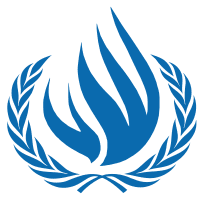 GENEVA (28 November 2014) - On 28 November 2014, the United Nations Committee Against Torture (CAT) issued its Concluding Observations on Australia's Fourth and Fifth Periodic Reports under the United Nations Convention against Torture and Other Cruel, Inhuman or Degrading Treatment or Punishment ("Convention Against Torture").
GENEVA (28 November 2014) - On 28 November 2014, the United Nations Committee Against Torture (CAT) issued its Concluding Observations on Australia's Fourth and Fifth Periodic Reports under the United Nations Convention against Torture and Other Cruel, Inhuman or Degrading Treatment or Punishment ("Convention Against Torture").
The Committee Against Torture is the body of 10 independent experts that monitors implementation of the Convention Against Torture by its State parties. The Convention Against Torture is one of the most widely ratified human rights instruments in the world, with 156 State parties.
All States parties are obliged to submit regular reports to the Committee on how the rights are being implemented. States must report initially one year after acceding to the Convention and then every four years. The Committee examines each report and addresses its concerns and recommendations to the State party in the form of "concluding observations".
Some of the Committee's key recommendations to the Australian government include:
- Repeal the policy of mandatory immigration detention for all unauthorized arrivals and ensure that immigration detention is used as a measure of last resort and only where strictly necessary.
-
Impose statutory time limits for detention and provide detainees with access to effective judicial remedies.
- Guarantee that all asylum seekers who are under Australia's "effective control" are protected against torture, inhumane and degrading treatment, regardless of their mode and/or date of arrival. This includes persons transferred to regional processing centres in Papua New Guinea and Nauru
- "[C]ontinue and redouble its efforts with a view to expanding the use of alternatives to closed immigration detention."
"The Committee remains concerned that detention continues to be mandatory for all unauthorised arrivals, including for children, until the person concerned is granted a visa or removed from the State party. It is also concerned that the law does not establish a maximum length for a person to be held in immigration detention, reportedly resulting in protracted periods of deprivation of liberty. The Committee is further concerned at reports that stateless persons whose asylum claims have not been accepted and refugees with an adverse security or character assessment can be detained indefinitely (arts. 2, 11 and 16)."
The Committee also expressed its concern over the transfer of asylum seekers to processing centres on Manus, in Papua New Guinea, and Nauru, “despite reports on the harsh conditions prevailing in these centres, including mandatory detention, including for children; overcrowding, inadequate healthcare; and even allegations of sexual abuse and ill-treatment”.
Cartagena +30: Declaración de Brasil incluye la no detención y alternativas
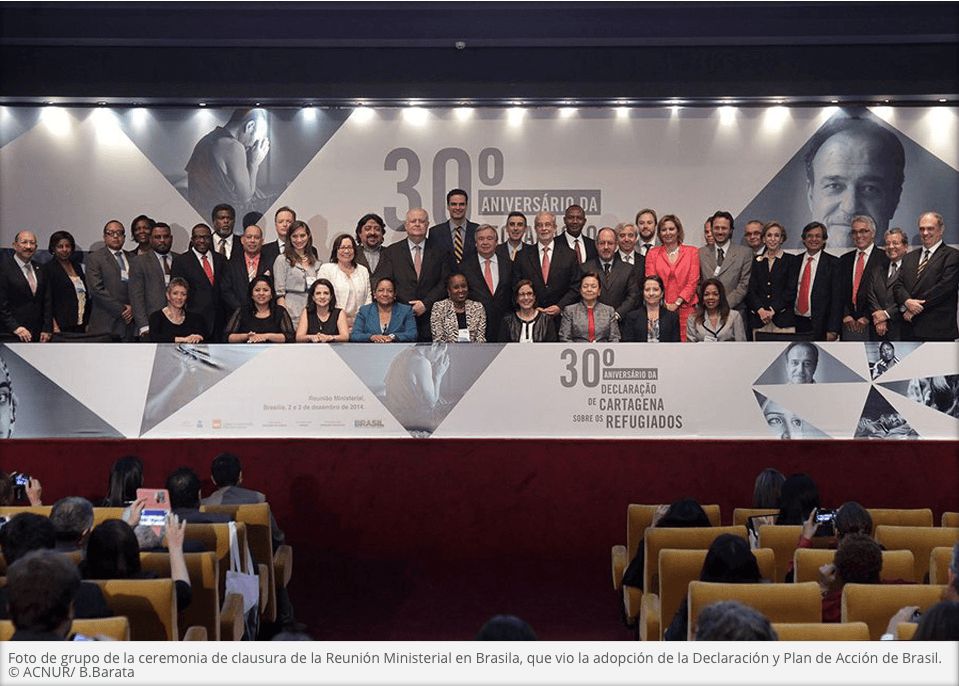
Las celebración del 30 Aniversario de la Declaración de Cartagena concluye con la Declaración y el Plan de Acción de Brasil, aprobados por los gobiernos de América Latina y el Caribe el 3 de diciembre del 2014. Ambos documentos incluyen llamados para la erradicación de la detención de niños, niñas y adolescentes migrantes, así como proponen avances para las alternativas a la detención. La Declaración de Brasil, “Un Marco de Cooperación y Solidaridad Regional para Fortalecer la Protección Internacional de las Personas Refugiadas, Desplazadas y Apátridas en América Latina y el Caribe” reconoce la Opinión Consultiva 21 de la Corte Interamericana de Derechos Humano, afirmando que "la privación de la libertad de los niños y niñas migrantes en situación irregular, decretada por esta única circunstancia, es arbitraria" y hace un compromiso para erradicar la detención de niños y adolescentes migrantes (p. 5).
Asimismo, el Plan de Acción de Brasil, “Una Hoja de Ruta Común para Fortalecer la Protección y Promover Soluciones Sostenibles para las Personas Refugiadas, Desplazadas y Apátridas en América Latina y el Caribe dentro de un Marco de Cooperación y Solidaridad” propone regulaciones para la implementación de alternativas a la detención dentro de su plan para zonas fronterizas, así como mayor acceso a las alternativas dentro del plan específico para el Caribe. Mientras aún hay mucho trabajo por realizar, el IDC considere estos compromisos como logros importantes, resultantes de la colaboración entre IDC y sus miembros y socios a lo largo del proceso de Cartagena +30.
Leer el comunicado de prensa del ACNUR aquí
Leer el Plan de Acción de Brasil completo
Leer la Declaración de Brasil completa
Mayor información en el sitio web del ACNUR y del Consejo Norweigo de Refugiados
Cartagena +30: Brazil Declaration calls for non-detention and alternatives

Commemorating the +30 Cartagena Anniversary, the Brazil Declaration and Plan of Action was adopted by governments of Latin America and the Caribbean on December 3rd, 2014. Both documents include calls for the elimination of immigration detention of children and proposes advancements in alternatives to detention (ATDs).
The Brazil Declaration, "A Framework for Cooperation and Regional Solidarity to Strengthen the International Protection of Refugees, Displaced and Stateless Persons in Latin America and the Caribbean" recognises the Inter-American Court of Human Rights Advisory Opinion 21, affirming that "the deprivation of liberty of migrant children in an irregular situation, ordered solely for this reason, is arbitrary" and makes a commitment to end immigration detention of children (p. 5).
Similarly, the Brazil Plan of Action “A Common Roadmap to Strengthen Protection and Promote Sustainable Solutions for Refugees, Displaced and Stateless Persons in Latin America and the Caribbean within a Framework of Cooperation and Solidarity” proposes rules for the implementation of ATDs within a plan for border zones, and increased access to ATDs within a regional Caribbean plan, specifically. While there is still much work to be done, the IDC considers these commitments to be important achievements resulting from collaboration between IDC and its members and partners during the entire Cartagena +30 process.
Read UNHCR's press release here
Read the full Brazil Plan of Action
Read the full Brazil Declaration
Plan de Acción de Brasil (original in Spanish)
Declaración de Brasil (original in Spanish)
More information can be found at the UNHCR website and Norwegian Refugee Council website
New report on immigration detention in France in 2013
Five organisations authorised to enter immigration detention centres in France (Assfam, Forum Réfugiés, France Terre d’Asile, La Cimade and Ordre de Malte) have published their annual report on immigration detention, “Centres et Locaux de Rétention Administrative” in France in 2013.
According to this research, during 2013, more than 45.000 people were detained for migration-related reasons in France (this is reportedly the largest number of persons detained by any EU country). More than half (54%) of the individuals were reportedly deported without judicial monitoring of the compliance and respect of their rights by the police and the administration. In the overseas territories, the great majority of detained migrants reportedly don’t have access to a judge and conditions of detention are deplorable.
After the condemnation of France by the European Court of Human Rights in 2012, an administrative circular of 6 July 2012 implemented the decision of placing families in a residence facilities rather than being kept in immigration detention centres. Since then, child immigration detention has decreased in France. However, unaccompanied migrant children and families still end up in detention centres, not only in the overseas territory but also in the mainland France.
In 2013, there was reportedly an increase of 36% in the number of children in immigration detention, mainly in Mayotte where 3,512 minors were detained, including unaccompanied children and those with their families (compared to 2,674 children in 2012). This increase is due to a policy that does not protect foreign children in Mayotte where the circular of July 2012 is not applicable. Conversely, the number of children detained in mainland France with their families decreased from 99 in 2012 to 41 in 2013. 122 young people claiming to be children were also reportedly detained in the metropolis.
The report also expressed concern that people with familiar links in France, seriously ill people, and asylum seekers are still detained for up to 45 days in France. The immigration detention capacity in immigration detention centres (known as CRAs) has reportedly doubled in the last 10 years mainland France.
More information:
Post contributed by Oriol Vallès Freixas, 1 December 2014.
MENA News Roundup October / November
This news roundup is a compilation of tweets made by the IDC Co-ordinator for the Middle East and North Africa Region. For live updates follow @IDC_MENA
Regional:
The “Protection at Sea” dialogue, led by UNHCR was attended by IDC
- Human rights protection challenges affecting migrants at sea
- Morocco highlights migration not a control/security issue but needs humanitarian approach
- Chief of Italian Navy says “Mare Nostrum was not a pull factor”
- IOM Monitoring Migrant Deaths in Three Recent Shipwrecks: Spain, Italy, Yemen
Egypt:
Editorial on civil society amoung fears of repression & silencing
Ethiopia:
Ethiopia sees spike in arrival of Eritrean refugees
Israel:
New immigration detention laws passed
Migrants hope PM will turn over new leaf as Tel Aviv residents file police complaint
Plan to fine African asylum seekers’ employers, making it harder for asylum seekers to find work & settle
Jordan:
Queries over border closure
Libya:
Ten migrants dead and dozens missing
Widespread & systematic torture creates huge need for rehabilitation
Human Rights Watch urges states to suspend returns to Libya

